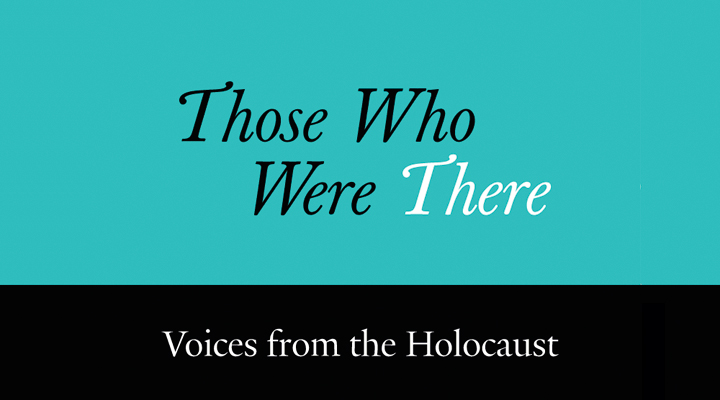This second season of “Those Who Were There” is produced in affiliation with the Museum of Jewish Heritage—A Living Memorial to the Holocaust. The Museum of Jewish Heritage began recording Holocaust testimonies in 1989. It was part of a cooperative effort with the Fortunoff Video Archive to document the experiences of Holocaust survivors and witnesses. In all, the Museum of Jewish Heritage gathered nearly 600 testimonies.
Eleanor Reissa: Welcome to “Those Who Were There: Voices from the Holocaust,” a podcast drawn from Yale University’s Fortunoff Video Archive for Holocaust Testimonies. I’m Eleanor Reissa.
This second season of “Those Who Were There” is produced in affiliation with the Museum of Jewish Heritage—A Living Memorial to the Holocaust. The Museum of Jewish Heritage began recording Holocaust testimonies in 1989. It was part of a cooperative effort with the Fortunoff Video Archive to document the experiences of Holocaust survivors and witnesses. In all, the Museum of Jewish Heritage gathered nearly 600 testimonies.
Over the coming weeks, we’ll be sharing stories from 10 individuals—drawn from the audio portion of the museum’s videotaped recordings. For example, you’ll hear from Sally Frishberg. As a child, she survived for two years hiding in a Polish farmer’s cramped attic.
Sally Frishberg: He took us to his little humble abode. And, uh, he took us upstairs to the attic. And, uh, there we got up and on the hay. We made ourselves comfortable. And after we were all up there, we, uh—he locked the trap door. He took away the ladder so that his kids won’t come up there. And, uh, we found that he had prepared for us large pots to use as toilets. And that’s all there was up there. And we just lay there. And we lay there day in and day out. We had to be silent, absolutely silent.
ER: You’ll also hear from Isaac Zieman, a young Latvian whose wartime odyssey took him across the entire breadth of the Soviet Union.
Isaac Zieman: And when we came to Chelyabinsk, we were sent to a kolkhoz, a collective farm, called Svobodnyi Trud, which means “free labor,” and we were free laborers. We were laborers that were only given to eat, but not paid anything else. And we were given work to dig ditches, which we did.
ER: And you’ll hear from Annelies Herz, who spent most of the war hiding in Berlin with her nearly blind twin sister.
Annelies Herz: Most of the time, we were sleeping on railroad stations or in swim clubs where, in these little booths where people changed—and this was in the ice cold winter—and we would sleep there. Actually, we were always on the run.
ER: These are just three of the people you’ll meet in the episodes to come.
The people whose stories we share in this podcast lived meaningful lives despite the suffering they carried with them. Through their recorded testimonies, we get a small glimpse into the unimaginable experiences that shaped them—and shaped our world. Their voices are a stark reminder of the millions of people who did not live to tell their stories.
In addition to listening to these stories, we hope that you’ll visit the podcast’s companion website at thosewhowerethere.org. The website includes historical context for each episode, full transcripts, and archival photographs. That’s where you can also find our previous episodes and background information on the Fortunoff Video Archive and the Museum of Jewish Heritage.
“Those Who Were There” is a production of the Fortunoff Video Archive for Holocaust Testimonies, which is housed at the Yale University Library’s Manuscripts and Archives Department in New Haven, Connecticut. This second season is a co-production with the Museum of Jewish Heritage—A Living Memorial to the Holocaust, New York’s contribution to the global responsibility to never forget. The museum is committed to the crucial mission of educating diverse visitors about Jewish life before, during, and after the Holocaust.
This podcast is produced by Nahanni Rous; Eric Marcus; the Fortunoff Archive’s director, Stephen Naron; and Treva Walsh, collections project manager at the Museum of Jewish Heritage.
Thank you to audio engineer Jeff Towne. Thanks, as well, to Christy Bailey-Tomecek, Joana Arruda, Noa Gutow-Ellis, and Inge De Taeye for their assistance. And thank you to Sam Kassow for historical oversight, and to photo editor Michael Green, genealogist Michael Leclerc, and our social media team, including Cristiana Peña, Nick Porter, and Sara Barber. Ljova Zhurbin composed our theme music.
Special thanks to the Fortunoff family and other donors to the archive for their financial support.
I’m Eleanor Reissa. Thank you for listening.
###

